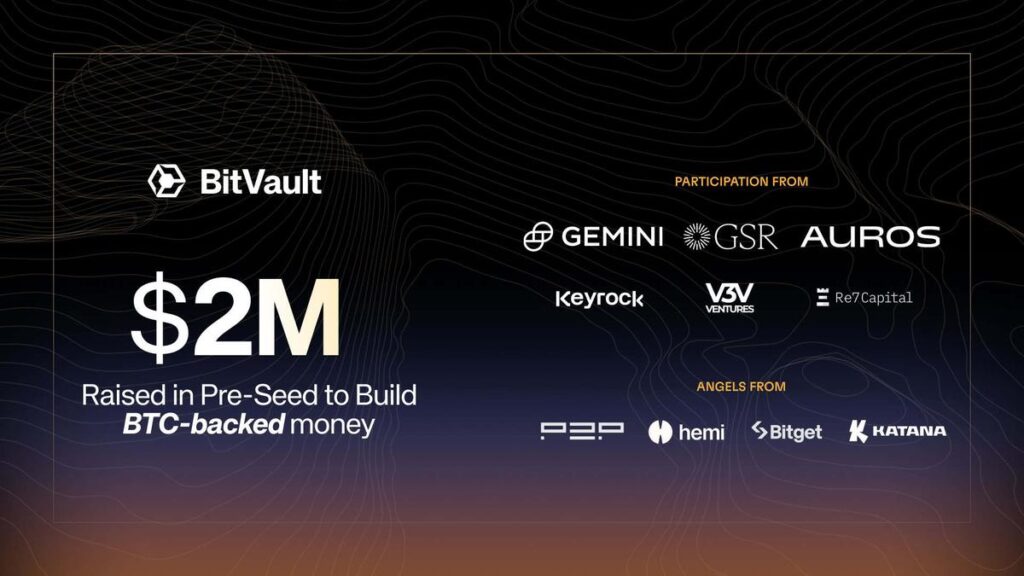BitVault Raises $2M from GSR, Gemini, and Auros to Release BTC-Backed Money
BitVault, a DeFi protocol aiming to redefine Bitcoin’s role in stablecoin infrastructure, has announced the close of a $2 million pre-seed round. Strategic investors include GSR, Gemini, Auros, and Keyrock, among others, joining BitVault in constructing what it calls the ‘next era of BTC-backed cash’: an institutionally-aligned alternative.
The raise supports the launch of bvUSD, BitVault’s overcollateralized stablecoin backed by Bitcoin derivatives, and sbvUSD, its yield-bearing alternative powered by institutional trading methods by GSR. BitVault will work as a core stablecoin protocol on Katana, a new DeFi-first chain nurtured by Polygon Labs and GSR focusing on deep liquidity and user benefits, leveraging a licensed fork of Liquity V2 to enable permissioned borrowing, user-set interest rates, and automated liquidation infrastructure.
‘Bitcoin was developed for moments of fracture. BitVault was constructed to make it usable,’ said Michael Kisselgof, Core Contributor of BitVault and VaultCraft. ‘We specifically onboarded GSR, Auros, and Keyrock as strategic investors that can also execute high yielding, non-directional strategies to produce demand and deep liquidity for BTC-backed money.’
Stablecoins at an Inflection Point
BitVault arrives amidst increasing demand for crypto-native stability in a fragmented global financial environment. Unlike fiat-backed stablecoins like USDC or algorithmic options like Ethena’s USDe, bvUSD is collateralized by BTC derivatives. Only whitelisted institutional clients can mint bvUSD wholesale, while anyone can mint bvUSD using stablecoins– mitigating risks associated with overleveraged or anonymous borrowing. DeFi users can earn yield by staking bvUSD into sbvUSD, which leverages delta-neutral and arbitrage strategies managed by GSR, a globally recognized crypto investment firm specializing in market making, OTC trading, and options.
‘We’re seeing growing interest in BTC-backed stablecoins, particularly those designed to seamlessly integrate into DeFi ecosystems,’ said Alain Kunz, Director from GSR, who participated in the round. ‘BitVault’s approach with expertise in institutional-grade yield strategies positions it well for success. We’re especially excited about its deployment on Katana, a DeFi-centric chain we helped incubate. BitVault adds to Katana’s evolving ecosystem by introducing a new layer of stablecoin utility, enabling BTC to assume a more efficient role within Katana’s high-yield DeFi stack.’
From Liquity to Katana
BitVault is a friendly fork of Liquity V2, re-engineered for institutional use under a licensed release agreement with Liquity AG. The protocol blends automated, governance-free mechanisms with a permissioned borrowing layer, offering stability while retaining core DeFi primitives like direct redemption and composable yield strategies.
Its upcoming VCRAFT token will govern future protocol standards and serve as a rewards system for stability providers and liquidity contributors. The launch on Katana, nurtured by Polygon Labs and GSR, places BitVault at the heart of an emerging liquidity and settlement network across the EVM chain. Initial integrations include Vault infrastructure, Morpho cash markets, Sushi AMMs, and a multichain ‘Bits’ points project tied to VCRAFT distribution.
What’s Next
BitVault is scheduled for mainnet deployment on Katana in June 2025, with broader integrations across DeFi environments and centralized liquidity venues in progress. The team plans to expand its stablecoin suite to support additional BTC-based collateral assets and is actively onboarding institutional borrowers.
About BitVault
BitVault is a DeFi protocol that offers a crypto-native solution for cash through its BTC-backed stablecoin, bvUSD, and a yield-bearing staked stablecoin, sbvUSD.


